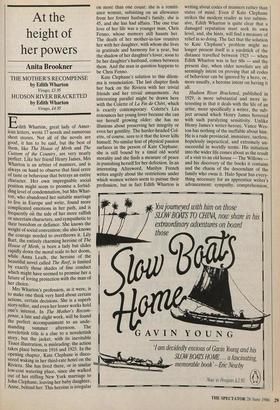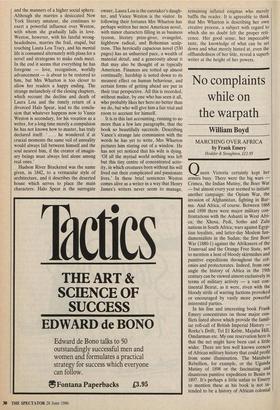At the height of her powers
Anita Brookner
THE MOTHER'S RECOMPENSE by Edith Wharton
Virago, £3.95
HUDSON RIVER BRACKETED by Edith Wharton
Virago, f4.95
Edith Wharton, great lady of Amer- ican letters, wrote 17 novels and numerous short stories. Not all of the novels are good, it has to be said, but the best of them, like The House of Mirth and The Custom of the Country, are very nearly perfect. Like her friend Henry James, Mrs Wharton is an arbiter of manners, and is always on hand to observe that fatal error of taste or behaviour that betrays an entire character. Her own impregnable social position might seem to promise a forbid- ding level of condemnation, but Mrs Whar- ton, who abandoned her suitable marriage to live in Europe and write, found more complicated emotions in her path, and is frequently on the side of her more raffish or uncertain characters, and sympathetic to their boredom or defiance. She knows the weight of social convention; she also knows the courage needed to overthrows it. Lily Bart, the entirely charming heroine of The House of Mirth, is born a lady but slides rapidly down the moral scale to her doom, while Anna Leath, the heroine of the beautiful novel called The Reef, is limited byexactly those shades of fine conduct which might have seemed to promise her a future of loving protection with the man of her choice.
Mrs Wharton's profession, as it were, is to make one think very hard about certain actions, certain decisions. She is a superb story-teller, and even her lesser works hold one's interest. In The Mother's Recom- pense, a late and slight work, will be found the perfect accompaniment to an unde- manding summer afternoon. The novelettish title is a clue to a novelettish story, but the jacket, with its inevitable Tissot illustration, is misleading: the action takes place between 1916 and 1925. In the opening chapter, Kate Clephane is disco- vered waking in her third-rate hotel on the Riviera. She has lived there, or in similar low-cost watering place, since she walked out of her stifling New York marriage to John Clephane, leaving her baby daughter, Anne, behind her. This heroine is irregular on more than one count: she is a remitt- ance woman, subsisting on an allowance from her former husband's family, she is 45, and she has had affairs. The one true love of her life was a younger man, Chris Fenno, whose memory still haunts her. The death of her mother-in-law reunites her with her daughter, with whom she lives in gratitude and harmony for a year, but the shadow of her daughter's lover, soon to be her daughter's husband, comes between them. And the man in question happens to be Chris Fenno.
Kate Clephane's solution to this dilem- ma is renunciation. The last chapter finds her back on the Riviera with her trivial friends and her trivial amusements. An interesting parallel might be drawn here with the Colette of La Fin de Cheri, which is exactly contemporary. Colette's Lea renounces her young lover because she can see herself growing older: she has no illusions about preserving her integrity or even her gentility. The harder-headed Col- ette, of course, sees to it that the lover kills himself. No similar hint of physical passion surfaces in the person of Kate Clephane: she is still bound by a timid old world morality and she finds a measure of peace in punishing herself for her defection. In an interesting Afterword, Marilyn French writes angrily about the restrictions under which women writers seem to pursue their profession, but in fact Edith Wharton is writing about codes of manners rather than states of mind. Even if Kate Clephane strikes the modern reader as too submis- sive, Edith Wharton is quite clear that a damaged reputation must seek its own level, and, she hints, will find a measure of relief in so doing. The fact that the solution to Kate Clephane's problem might no longer present itself is a yardstick of the distance travelled between 1925 — when Edith Wharton was in her 60s — and the present day, when older novelists are all seemingly intent on proving that all codes of behaviour can be ignored by a hero, or, more usually, a heroine intent on having it all.
Hudson River Bracketed, published in 1929, is more substantial and more in- teresting in that it deals with the life of an artist, more specifically a writer, the sub- ject around which Henry James hovered with such paralyzing sensitivity. Unlike Henry James's writer-heroes, Vance Wes- ton has nothing of the ineffable about him. He is a rude provincial, immature, tactless, hopelessly impractical, and extremely un- successful in worldly terms. His initiation into the wider life comes about as the result of a visit to an old house — The Willows and his discovery of the books it contains and the charm of the descendant of the family who owns it. Halo Spear has every- thing necessary for an apprentice writer's advancement: sympathy, comprehension,
and the manners of a higher social sphere. Although she marries a desiccated New York literary amateur, she continues to exert a powerful influence over Weston, with whom she gradually falls in love. Weston, however, with his fateful wrong- headedness, marries the frail, stupid, but touching Laura Lou Tracy, and his mental life is consumed alternately with plans for a novel and strategems to make ends meet. In the end it seems that everything he has foregone — love, recognition, worldly advancement — is about to be restored to him, but Mrs Wharton is too clever to allow her readers a happy ending. The strange melancholy of the closing chapters, which recount the decline and death of Laura Lou and the timely return of a divorced Halo Spear, lead to the conclu- sion that whatever happens now to Vance Weston is secondary, for his vocation as a writer, for a long time merely a compulsion he has not known how to master, has truly declared itself: . . . he wondered if at crucial moments the same veil of unreality would always fall between himself and the soul nearest him, if the creator of imagin- ary beings must always feel alone among real ones.'
Hudson River Bracketed was the name given, in 1842, to a vernacular style of architecture, and it describes the deserted house which serves to place the main characters: Halo Spear is the surrogate owner, Laura Lou is the caretaker's daugh- ter, and Vance Weston is the visitor. In following their fortunes Mrs Wharton has perhaps written her most American novel, with minor characters filling in as business tycoon, literary prize-giver, evangelist, highbrow radical, and Bohemian sculp- tress. This heroically capacious novel (530 pages) has an unhurried pace, a wealth of material detail, and a generosity about it that may also be thought of as typically American. Finances are totted up almost continually, hardship is noted down to its meanest effect on human behaviour, and certain forms of getting ahead are put in their true perspective. All this is recorded, without malice, by one who has seen it all, who probably likes her hero no better than we do, but who will give him a fair trial and room to account for himself.
It is in this last accounting, running to no more than a few late paragraphs, that the book so beautifully succeeds. Describing Vance's strange late communion with the words he has yet to write, Mrs Wharton pictures him staring out of a window. He has not yet noticed that his wife is dying. `Of all the myriad world nothing was left but this tiny centre of concentrated activ- ity, in which creatures born without his will lived out their complicated and passionate lives.' In these brief sentences Weston comes alive as a writer in a way that Henry James's writers never seem to manage, remaining inflated enigmas who merely baffle the reader. It is agreeable to think that Mrs Wharton is describing her own creative process, a subject with regard to which she no doubt felt the proper reti- cence. Her good sense, her impeccable taste, the knowledge of what can be set down and what merely hinted at, even the offhandedness of her title, reveal a superb writer at the height of her powers.



















































 Previous page
Previous page